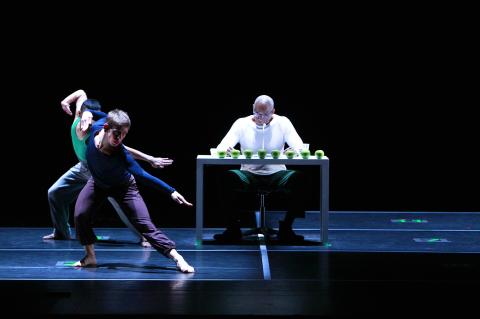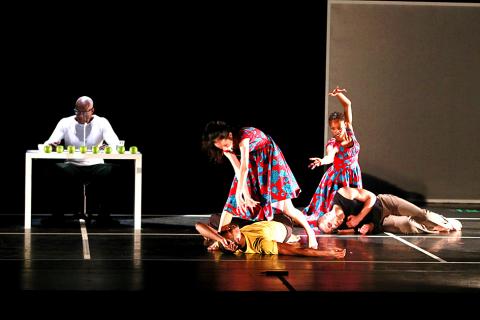As so often happens with dance in Taiwan, fans suffer through periods of feast and famine, though luckily the former is usually the problem. Contemporary dance fans have an even tougher choice this weekend with performances by two legends — but at either end of the country.
French ballerina-turned-modern dancer Sylvie Guillem has brought her show, 6000 Miles Away, to Taipei for two performances at the National Theater, while Greater Kaohsiung is playing host to the Bill T. Jones/Arnie Zane Dance Company, which is performing Jones’ latest work, Story/Time at the Chihteh Hall in the Kaohsiung Cultural Center tonight and tomorrow afternoon.
Dance lovers in southern Taiwan owe a huge debt of gratitude to the programmers of the annual Kaohsiung Spring Arts Festival (高雄春天藝術節) for managing to arrange an appearance by Jones’ company, only the second time it has visited Taiwan.

Credit: Courtesy of Paul B Goode
The troupe’s first trip was almost seven years ago, in September 2007, when it performed Jones’ Blind Date at the National Theater in Taipei.
Of great interest to the local media at that time was Taiwanese dancer Lin Wen-chung (林文中), who had been with the company for seven years and was in his final weeks with Jones, having decided to move back home to strike out on his own.
This time around, another dancer is happy to be returning to Taiwan to show family and friends what she has been doing in New York City. Taipei National University of the Arts dance program-graduate Liu I-ying (劉奕伶) has performed with several local troupes, including Ku and Dancers (古名伸舞蹈團) and the Neo-Classic Dance Company (新古典舞團). She joined Jones’ group the year after Lin left, in 2008, although she had served as an apprentice the previous year.

Credit: Courtesy of Paul B Goode
The Bill T. Jones/Arnie Zane Dance Company is now in its 31st year, and luckily the 62-year-old Jones shows no signs of slowing down. In addition to being a dancer and prize/fellowship-winning choreographer, Jones is a writer and a theater director, having co-written and directed the Tony-award winning musical Fela about Nigerian composer and activist Fela Anikulapo Kuti, which premiered on Broadway in 2009.
Early on in his works he began incorporating both text and video, breaking down the walls between a purely “dance” piece and theater. Text plays a key role in Story/Time, which premiered in 2012.
Story/Time was inspired by avant-garde US composer John Cage, whose professional life became inextricably linked with another modern dance great, Merce Cunningham. Cage released an album in 1958 called Indeterminancy, in which he read a series of short stories as David Tudor improvised musical passages on a piano in another room. The trick was that neither man could hear what the other was doing. Cage also performed the piece on stage.
Jones took that idea of mixing narrative with another art form, yet not deliberately connecting them. He wrote about 170 largely autobiographical stories, each a minute or so long. For each show, he chooses 70 of the stories to tell, reading them out in his beautiful, melodious voice while seated behind a simple desk — behind a row of eight green apples — as his dancers perform snippets of choreography that he either created fresh for this piece or assembled from past works along with his long-time associate artistic director Janet Wong.
Like Indeterminancy, the confluence of stories and dances in Story/Times is a matter of chance, not design, but the show is no less spellbinding for it.
It is hard to begrudge the Kaohsiung festival for managing to snare Jones’ and company, given that Taipei usually scores all the big-name performances, but I hope Taipei-area fans do not have to wait another seven years to see the troupe again.
This story has been corrected since it was first published to amend the photographer's credit.

Oct. 21 to Oct. 27 Sanbanqiao Cemetery (三板橋) was once reserved for prominent Japanese residents of Taipei, including former governor-general Motojiro Akashi, who died in Japan in 1919 but requested to be buried in Taiwan. Akashi may have reconsidered his decision if he had known that by the 1980s, his grave had been overrun by the city’s largest illegal settlement, which contained more than 1,000 households and a bustling market with around 170 stalls. Fans of Taiwan New Cinema would recognize the slum, as it was featured in several of director Wan Jen’s (萬仁) films about Taipei’s disadvantaged, including The Sandwich

“Wish You Luck is not just a culinary experience, it’s a continuation of our cultural tradition,” says James Vuong (王豪豐), owner of the Daan District (大安) Hong Kong diner. On every corner of Kowloon, diners pack shoulder-to-shoulder over strong brews of Hong-Kong-style milk tea, chowing down on French Toast and Cantonese noodles. Hong Kong’s ubiquitous diner-style teahouses, known as chachaanteng (茶餐廳), have been a cultural staple of the city since the 1950s. “They play an essential role in the daily lives of Hongkongers,” says Vuong. Wish You Luck (祝您行運) offers that same vibrant melting pot of culture and cuisine. In

Much noise has been made lately on X (Twitter), where posters both famed and not have contended that Taiwan is stupid for eliminating nuclear power, which, the comments imply, is necessary to provide the nation with power in the event of a blockade. This widely circulated claim, typically made by nuclear power proponents, is rank nonsense. In 2021, Ian Easton, an expert on Taiwan’s defenses and the plans of the People’s Liberation Army (PLA) to break them, discussed the targeting of nuclear power plants in wartime (“Ian Easton On Taiwan: Are Taiwan’s nuclear plants safe from Beijing?”, April 12, 2021). The

Artificial intelligence could help reduce some of the most contentious culture war divisions through a mediation process, researchers say. Experts say a system that can create group statements that reflect majority and minority views is able to help people find common ground. Chris Summerfield, a co-author of the research from the University of Oxford, who worked at Google DeepMind at the time the study was conducted, said the AI tool could have multiple purposes. “What I would like to see it used for is to give political leaders ... a better sense of what people ... really think,” he said, noting surveys gave